Interaction within Social Science Research
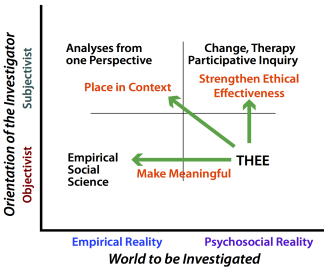
Interactions amongst parts of social science can be illuminated by creating a 2x2 Table that distinguishes and combines psychologically opposing foci of inquiry («world to be investigated») and style of inquiry («orientation of the inquirer»). See previous Topic.
As repeatedly emphasized, the discovery of a unified Taxonomy drew, and still draws, heavily on the work of social observers, the findings of therapists and change agents, hard social scientists, reflective practitioners and thinkers of all sorts down the ages.
A Taxonomy like THEE can offer a return contribution to all forms of inquiry. It can make empirical studies meaningful by reducing conceptual confusion, it can place ideological studies in a practical context, and it can strengthen the ethical effectiveness of participative inquiries.
Controversies
There is a natural antagonism between diagonally opposing quadrants: which is unsurprising, given that the two forms of inquiry embody polar opposite positions on both fundamental psychosocial dimensions.
► Objectivist Empirical ↔ Subjectivist Psychosocial
 Detail►
Detail►
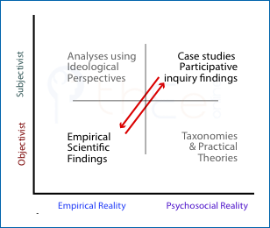
Physical scientists and strict empiricists, by and large, cannot accept research findings from psychotherapies, action research or field studies. These research styles are all far too uncontrolled, far too subject to conscious and unconscious biases, and far too qualitative. Measurement is frequently noticeable by its absence.
In return, those who work, or rather give of themselves, to better society and help people, view hard science as an opt out. They utterly reject the notion of a «value-free social science», and deplore the fetish for control and measurement.
► Subjectivist Empirical ↔ Objectivist Psychosocial
 Detail►
Detail►
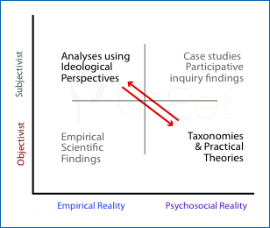
Ideologists are uncomfortable with or reject frameworks that claim to be value-neutral or uncommitted. It does not feel right to have their precious perspective placed as just one amongst a set of necessarily valid perspectives. Creative questioning of any deeply held ideology is disturbing.
Framework creators, for their part, dislike bias, extreme positions and aggressive attitudes. They also fear the harm and unfairness that may flow from constantly applying just one perspective and ruthlessly rejecting others.
Synergies
Social scientists who either share the focus of study, or share the style of study have greater potential for beneficial mutual influence and assistance.
► Subjectivist Psychosocial ↔ Objectivist Psychosocial
 Detail►
Detail►
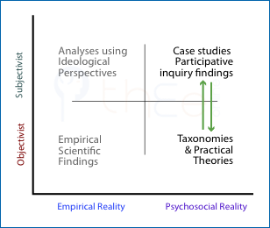
Awareness of what works and makes sense for reflective practitioners is needed by any objectivist inquirer. Consulting was the initial source of ideas that led to developing THEE. In the same way, experiences of psychotherapy produced psychoanalytic theories. Taxonomic inquiry then found  that several psychoanalytic theories have a place in a Typology alongside other non-dynamic theories of mental stabilization.
that several psychoanalytic theories have a place in a Typology alongside other non-dynamic theories of mental stabilization.
THEE's Frameworks (as well as other developed theories) can assist community workers, management consultants, therapists, and advisors to understand their own interventions. The result could be a more appropriate, more ethical and more effective intervention strategy. Such engagement helps Frameworks become refined (i.e. corrected, improved) and validated (or rejected).
► Objectivist Psychosocial ↔ Objectivist Empirical
 Detail►
Detail►
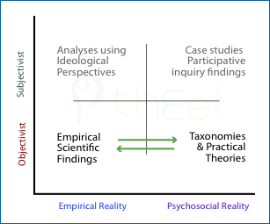
THEE's Frameworks have informed objective scientific inquiries by providing guidance as to worthwhile hypotheses and relevant issues that need control to avoid confusing outcomes. Much more is possible in this arena. The opportunities are quite exciting.
Solid scientific findings should be able to throw light on certain fundamentals. These would need to be taken into account in the development and application of THEE Frameworks. Empirical science might also help with issues of comprehensiveness, universality and precision in naming and formulating.
► Subjectivist Empirical ↔ Subjectivist Psychosocial
 Detail►
Detail►
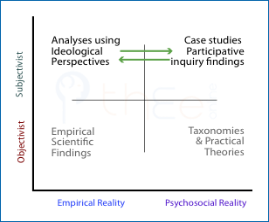
Many critical theorists want to change society or groups or relationships within society in accord with what they discover from their analyses. Marxist analyses are the best known. However, the US government funds groups to analyse economic and social situations from a liberal capitalist perspective. The notion behind all such efforts is always to affect society for its own «good» i.e. according to the initial bias.
Participants in community development and helpers for alienated groups in society often feel frustrated at their inability to generate development (as they see it). Some then look for contextual factors in the culture or society so as to analyse the situation from their preferred ideology or perspective. Bias is again in-built.
► Objectivist Empirical ↔ Subjectivist Empirical
 Detail►
Detail►
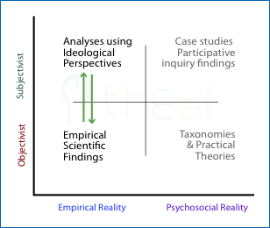
Interpretive analyses may pick and choose from empirical findings to suit their bias. Alternatively their analyses offer an exposé of hidden influences (e.g. source of funds) or an exegesis of studies to reveal ignored ideological assumptions. The aim here is typically to show that, unlike physical science, there is no such thing as «neutrality» in social science.
Objective empirical research tends to regard ideologies as «unfalsifiable and untestable» and so turns away. Such scientists miss the point that an ideology is not your usual theory, but an ethical entity that absolutely requires to be upheld with conviction. Belief is not an option. (Of course, scientists believe in science.) Occasionally conventional research is conducted from within an ideological paradigm—see more in the Arenas of Association PH'5Q).
Researcher Preoccupations
Paradigmatic research methods (PH'2) are available for investigators in both worlds. As might be expected, the quadrants show differential preferences and this is due in part to differences in the principal preoccupation of the researcher.
Objectivist: The principal preoccupation in both worlds for objectivist inquirers is with precision and veridical correspondence.
For empirical reality, this is largely achieved via measurement(PH2L4) and controlled testing (PH'2L3), which allow powerful mathematical tools to be used.
For psychosocial reality, this is largely achieved via formulations (sPH5-G43) because this reality is constructed via communication-PH5. Research rigor is provided by analytic (PH'2L2) and holistic (PH'2L5) methods because these allow for change and personal autonomy.
Subjectivist: The principal preoccupation in both worlds for subjectivist inquirers is with maintenance of a value system (PH6L6).
For empirical reality, this is largely achieved via an ideology (sPH"6-G23) held to be true (or right) by the user and to provide the necessary power in a social context.
For psychosocial reality, this is largely achieved via mental stabilization (PH'4) and modelling approaches (PH'3). The work of healing or development involves enabling a person or group to gain perspective and willingly change in the light of the researcher's preferred approach.
Originally posted: May 2010. Last updated: 25 April-2022

![]() Detail►
Detail►![]() Detail►
Detail►![]() Detail►
Detail►![]() Detail►
Detail►![]() Detail►
Detail►![]() Detail►
Detail►




